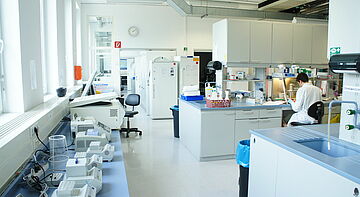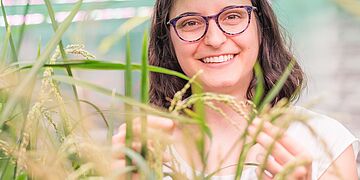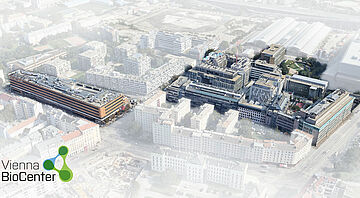
Cell and Chromosome Biology
What are the universal principles underlying cell structure and function?
To get fundamental insights into how a cell, the basic unit of life, is organized and divides, a highly interactive research community at the Vienna BioCenter uses cutting-edge approaches, including super-resolution microscopy, high-content screening, biochemical reconstitution, and genomics, to functionally dissect the molecular biology of the cell.

Cells are the building blocks of life. Their astounding ability to perform diverse biological functions, such as replicating themselves or migrating to new locations, requires self-organization of macromolecules into higher-order structures like chromosomes, membrane-bound organelles, and phase-separated liquid-like compartments. A complete understanding of how cells are organized and how they function requires knowledge of their life cycle, metabolic processes, signaling pathways, transport mechanisms, and interactions with the environment. This fundamental knowledge also helps reveal how things can go wrong – disrupting cellular processes can lead to many different diseases such as cancer and autoimmune disorders.

Researchers at the Vienna BioCenter are investigating all of these processes, with projects in cell cycle and division, transmembrane and intracellular signal transduction, autophagy (‘self-eating’) and cell death, the cytoskeleton and cell migration, nuclear and genome organization, organelle biogenesis, and DNA damage responses. Chromosome research has traditionally been a strong focus at the Vienna BioCenter, particularly the study of chromosome segregation. Indeed, cohesin was discovered here in the 1990s while Kim Nasmyth was a group leader at the IMP. Today, scientists continue to investigate this fascinating and fundamental cellular process, including how cohesion is established and maintained, how it is released, and how errors leading to chromosome missegregation result in diseases such as cancer. Another aspect of chromosome biology being studied by several groups in various organisms is meiotic chromosome pairing and recombination, defects in which are a major cause of miscarriages and birth defects.

Cell biology research relies heavily on the visualization of cellular processes in living and developing organisms. Therefore, scientists working in this field interact closely with the Advanced Microscopy Facility, which offers both state-of-the-art commercial instruments and custom, purpose-built imaging systems. This includes light-sheet fluorescence microscopy, where bespoke systems are enabling higher spatiotemporal resolution for live cell studies with minimal phototoxicity.
Research Groups "Cell & Chromosome Biology"
| Research Group | Institute | Topic |
|---|---|---|
| Berger | GMI | Chromatin Architecture and Function |
| Dagdas | GMI | Autophagy-mediated cellular quality control mechanisms in plants |
| Ramundo | GMI | Chloroplast biogenesis and protein quality control |
| Gerlich | IMBA | Chromosome structure and dynamics |
| Goloborodko | IMBA | Theoretical Models of Chromosome Structure |
| Jachowicz | IMBA | “Dark” genome in early mammalian development |
| Penninger | IMBA | Modeling human disease |
| Saha | IMBA | Role of macromolecular phase separation in germline cell fate and totipotency |
| Haselbach | IMP | Watching molecular machines in action |
| Peters | IMP | Mitosis and chromosome biology |
| Baccarini | Max Perutz Labs | Deciphering the MAPK pathway in vivo |
| Campbell | Max Perutz Labs | Mechanisms that ensure chromosome segregation fidelity in mitosis |
| Dammermann | Max Perutz Labs | Centriole Assembly and Function |
| Ellis | Max Perutz Labs | Cell Competition and Tissue Fitness in Development and Disease |
| Foisner | Max Perutz Labs | Lamins in nuclear organization and human disease |
| Fuchs | Max Perutz Labs | Stress response in simple epithelia |
| Huis in 't Veld | Max Perutz Labs | Preventing DNA damage during mitosis |
| Jantsch | Max Perutz Labs | Meiosis in C. elegans |
| Klein | Max Perutz Labs | Chromosome Structure and Meiotic Recombination |
| Koehler | Max Perutz Labs | Nuclear Pores - Regulators of Chromatin and Membrane Dynamics |
| Martens | Max Perutz Labs | Molecular Mechanisms of Autophagy |
| Matos | Max Perutz Labs | Mechanisms of Genome Stability and Haploidisation |
| Ogris | Max Perutz Labs | PP2A enzyme biogenesis and monoclonal antibodies |
| Otsuka | Max Perutz Labs | Intra-cellular Communication between the ER and the Nucleus |
| Querques | Max Perutz Labs | Genome Plasticity and Engineering |
| Ries | Max Perutz Labs | Super-resolution microscopy for structural cell biology |
| Schloegelhofer | Max Perutz Labs | Meiotic Recombination |
| Slade | Max Perutz Labs | DNA damage response |
| Versteeg | Max Perutz Labs | Ubiquitin-mediated regulation of immune signaling |
| Weitzer | Max Perutz Labs | Somatic Stem Cells of the Heart |
| Ibl | Uni Vienna - Faculty of Life Sciences | Cell Biology in Crop Seeds |
| Lang | Uni Vienna - Faculty of Life Sciences | Structural and Functional Plant Cell Biology |
| Bulgheresi | Uni Vienna - Faculty of Life Sciences | Environmental cell biology |



